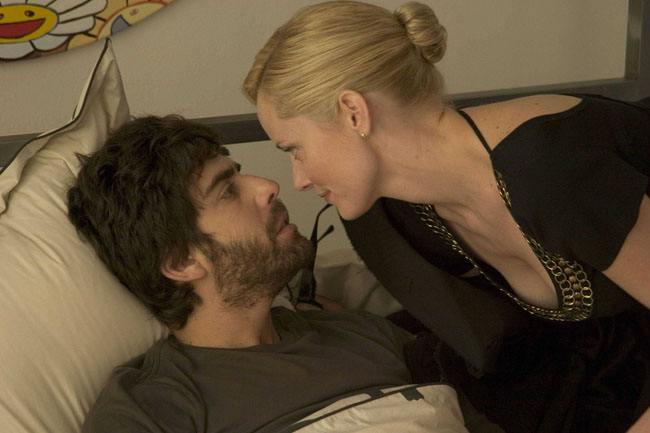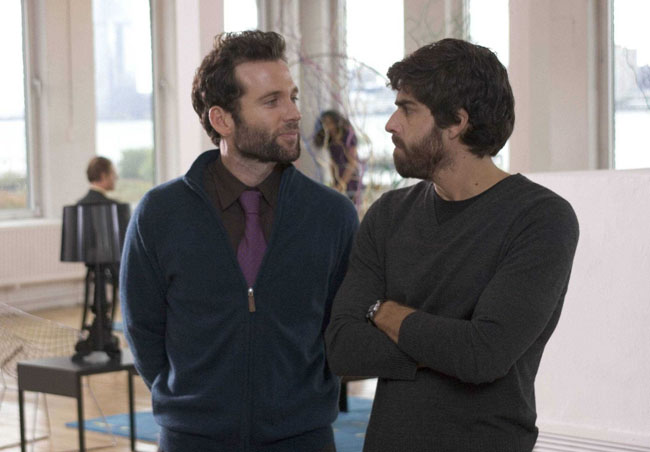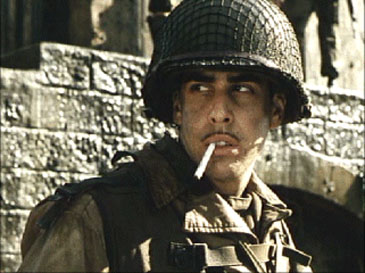CHICAGO – Patrick McDonald of HollywoodChicago.com appears on “The Morning Mess” with Dan Baker on WBGR-FM (Monroe, Wisconsin) on March 21st, 2024, reviewing the new streaming series “Manhunt” – based on the bestseller by James L. Swanson – currently streaming on Apple TV+.
Interview: Adam Goldberg on the Art of Performance in ‘(Untitled)’
CHICAGO – The Adam Goldberg character is well known to fans of TV’s “Friends” and the movie’s “Saving Private Ryan.” With his heart-on-his-sleeve persona, he takes that character to rarified heights in the new film “(Untitled).”
Set in the galleries and small symphony halls of New York City, (Untitled) is a deeply philosophical look at the nature of art, through three characters who each believe they understand the essence of what art is within themselves.
Adam Goldberg plays Adrian, a composer of atonal symphonies, whose work continues to go unrecognized. His brother Josh (Eion Bailey), is a successful painter of hotel decor-style art, who longs to be recognized for more. Rounding out the triad is Madelaine (Marley Shelton), the arty and pretentious gallery owner who strives for the next atmospheric happening.
 Photo credit: Parker Film Company/Samuel Goldwyn Films |
HollywoodChicago got the opportunity to talk to Adam Goldberg about this challenging and enlightening film, and his perspective provides further insights into this substantial release.
HollywoodChicago.com: You essentially played a darker, deeper variation on a character that you are known for, the twitchy neurotic intellectual type. How did your past work with that character type help you in relationship to your portrayal of Adrian?
Adam Goldberg: There were definitely certain aspects of myself that I needed to amplify for this film, and other aspects that I needed to turn down. It was a tuning process to find a balance, because there are definitely certain things I can relate to about Adrian and other things that were hyperbolized. However, after I read the script, I felt that the character was clearly defined.
HC: There is an uncompromising grace in arc of all the characters in (Untitled), a rare feat. Do you feel that you, your fellow actors and the rest of the production crew dug deeper within the material because it was so strong?
AG: In situation with films like this you don’t have as much time, and not as much money, but I’ve found that most people are there because they want to be there, as opposed to it just being a paying gig.
In a uniform sense the people involved were trying to tap as much as they possibly could in themselves. And the director, too, hired everyone because he knew they were going to be good. It turned out to be a very collaborative process. There wasn’t a lot of rehearsal or a lot of time, but there was a lot of discussion in tracking the character’s arcs.
With all the characters there are no definitive didactic statements. Their development is about walking the line and staying true to the character, but at the same time poking holes in the armor so the audience can see some vulnerability and what’s going on in them. In my character of Adrian, it was a minor shift. I had lots of discussion, for example, about how he wouldn’t smile.
 Photo credit: Parker Film Company/Samuel Goldwyn Films |
HC: (Untitled) is very poignant in showing the truth in staying true to one’s self in artistic expression, despite the pain it sometimes causes. How did you relate this to your character Adrian in the early readings of the script?
AG: In a sense, he is too true to his atonal musicianship, cutting off the harmony to spite his face. He on the one hand believes in what he is doing and on the other hand questions it. He stubbornly stands by his atonal self even though it is shown he is capable of playing beautiful melodies.
He overcompensates for his point of view in an effort to defend it. Ultimately the lesson in the film in part is that you can only end up doing what you do and being yourself. If that ends up being minimalist atonal cacophony so be it. But maybe it also means it’s okay to be successful. Some sort of mainstream acceptance does not equate to a lack of artistic integrity.
HC: We see a New York City in this film that is less familiar and more claustrophobic than usual screen portrayals. What was director Jonathan Parker communicating with this scenic approach?
AG: My sense from the very beginning was that although this is New York City, present day, that there was kind of other worldly feel to it. Adrian, for example, somehow has the last affordable bohemian apartment left in Soho. It’s a holdover from the old days.
Also the world the art gallery characters live in is a bubble world. Adrian’s bubble is even smaller. Although you can identify the area as New York City, it isn’t necessarily about New York as a whole but more of the ‘islands’ within the island.
HC: You are a published and recorded musician yourself. Did you relate to Adrian’s approach to his music art or did you think he was a little much and what did you personally learn about the atonal symphony composition?
AG: For many years I been a fan of the musician Steve Reich, who is a minimalist composer. He began with samples of hand claps, street sounds and pianos, and would phrase them to become this hypnotic repetition. Ultimately he incorporated these elements into very beautiful symphonic structures.
Where we find Adrian is in an earlier phase. He’s not necessarily getting it all right either, he’s become beholden to this intellectual concept that one thing has nothing to do with the other and those two worlds can’t co-exist.
To that extent I don’t relate to him, but I do relate to the idea using soundscapes and sound objects. I have done that in my own music, but it is tuneful. The idea is to create an atmosphere where the song lives. I get the atonal thing intellectually but don’t do it in my own music.
HC: Interestingly enough, the characters in (Untitled) all come to a redemption of sorts by the end. Which of the characters keep evolving the strongest, do you think, or has the best future ahead of them and why?
AG: In a weird way I think probably Eion Bailey’s character, who was my brother Josh in the film, there is something about the acceptance of who he is as himself. It is his character that decides that his artwork is not going to make the Museum of Modern Art, but this is the stuff he paints and he’s happy to be showing it, period.
Eion was last minute casting, replacing somebody who had dropped out. We were all on pins and needles because we were about to shoot. But he made some great choices for the character, with little evolutions rooted to himself.
HC: The art world can be both objective and subjective. What part of the pursuit of art, including your experience with acting and music, do you find to be most satisfying in this process of object and subject?
AG: I struggled with this a lot. Not so much as an actor, for as an actor I feel like my job is to do whatever I can with the material presented, sometimes I succeed and other times I don’t. The things I feel I can be judged on are the things I’ve created from the ground up.
My music, which was well received, and the two films I’ve created, which were more divided reactions, is what I’m most proud of. If I’m going to be judged for something, it should be for the things that I’ve put every ounce of myself into.
Ultimately nothing is more satisfying as the process of making my works. When you start with something that is nothing, a blank screen, and you end up with images, sounds, people’s performances, there is no failing in that regard. There will always be different perceptions of the work, but you can’t control that.
The success is never really enough anyway, what you are left with is what you’re going to do next. In the end, you need to embrace the fulfilling aspects of creation.
 Photo credit: © Dreamworks SKG |
HC: Even though you have never actually served in the military did you feel like you had after ‘Saving Private Ryan’ and what appreciation did you come away with for that service, especially in the context of the World War 2 veteran?
AG: It was a totally transformative experience, there is no question about it. As the years go by, the thing I kind of glean the most from that experience was this connection to service, in particular with the guys who fought that war. I was moved by those men and women, and even the homefront. What a different time it was, how connected everyone was. There was something about it that felt like another planet.
When I got home from it, I definitely felt like I had military experience. Particularly the boot camp, even though it was abbreviated. We were camping for five days, eating rations and referring to each other by our character names. It was as important to me to appeal to Dale Dye, the military advisor, as it was to appeal to Steven Spielberg. I had to portray this guy as honestly and thoughtfully in the military sense as in my acting performance.
HC: What was the atmosphere on the set of ‘Dazed and Confused?’ and are you surprised about the number of actors that broke out from that seminal film and had prosperous careers?
AG: I am not surprised. When we were doing it, we had concerns about how it was going to be released, because we wanted it to be as exciting to an audience as we thought it was. It was released in far fewer theaters than we all were led to believe. It was almost destined to be a cult movie just by virtue of how it worked out.
It was a great film to be a part of at the time, in that particular phase of being 17 through your early 20’s as an actor. So many people were so good in that film, that it was obvious it was going to be a breeding ground for breaking out, not unlike ‘Fast Times at Ridgemont High’ and ‘American Graffiti.’
It was a exciting set atmosphere, very familial and clique-oriented. It was like a very condensed college experience, even though it was only a month. We were all running amuck in this hotel, even a security guard made me stay in my room all night (laughs). It was a free-for-all the whole time.
 | By PATRICK McDONALD |


